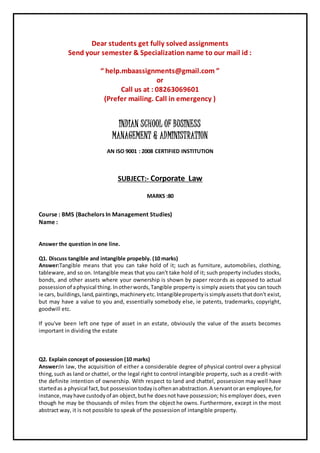
Corporate law
- 1. Dear students get fully solved assignments Send your semester & Specialization name to our mail id : “ help.mbaassignments@gmail.com ” or Call us at : 08263069601 (Prefer mailing. Call in emergency ) INDIAN SCHOOL OF BUSINESS MANAGEMENT & ADMINISTRATION AN ISO 9001 : 2008 CERTIFIED INSTITUTION SUBJECT:- Corporate Law MARKS :80 Course : BMS (Bachelors In Management Studies) Name : Answer the question in one line. Q1. Discuss tangible and intangible propebly. (10 marks) Answer:Tangible means that you can take hold of it; such as furniture, automobiles, clothing, tableware, and so on. Intangible meas that you can't take hold of it; such property includes stocks, bonds, and other assets where your ownership is shown by paper records as opposed to actual possessionof aphysical thing. Inotherwords,Tangible property is simply assets that you can touch ie cars, buildings,land,paintings,machineryetc.Intangiblepropertyissimplyassetsthatdon't exist, but may have a value to you and, essentially somebody else, ie patents, trademarks, copyright, goodwill etc. If you've been left one type of asset in an estate, obviously the value of the assets becomes important in dividing the estate Q2. Explain concept of possession (10 marks) Answer:In law, the acquisition of either a considerable degree of physical control over a physical thing,such as land or chattel, or the legal right to control intangible property, such as a credit-with the definite intention of ownership. With respect to land and chattel, possession may well have startedas a physical fact,but possessiontodayisoftenanabstraction.A servantoran employee,for instance,mayhave custodyof an object,buthe doesnothave possession; his employer does, even though he may be thousands of miles from the object he owns. Furthermore, except in the most abstract way, it is not possible to speak of the possession of intangible property.
- 2. Law Poweror control oversomething:possessionof afirearm. Occupationor control of a piece of property,withorwithoutownership. A rightof occupationanduse:The tenanthaspossessionof the apartmentuntil the endof the lease. Q3. Explain concept need not be in writing. (10 marks) Answer: Repeating key terms and phrases brings continuity to your writing. This practice also highlights important aspects of your argument for your reader. That being said, you must make consciouschoicesaboutwhatto repeat.Toomuch repetitionis boring. Using the exact same words within the same paragraph or the same phrase multiple times can make you appear to have a limited vocabulary, in addition to making your paper arduous or tedious to read. Essentially, you should repeat yourself, but with a difference! One way toavoidappearingoverlyrepetitive istoconsulta thesaurus and use synonyms. However, when using synonyms, you should make Q4. Differentiate between offer and invitation to offer (10 marks) Answer:A contract is an agreement between the contractor and the client which is binding in law. Clients define the project objectives, schedule and the budget. Contractors are hired by the client and are responsible to carry out the work, under the terms and subject to the deadlines, quality of the work and stay within the budget. Offer and acceptance must be present for a contract to be formed. Both parties are intended to create a legal relations and the negotiation between both parties are generally take place before an agreement becomes binding and a contract is formed. Q5. Is it safe to go in for oral contracts? (10 marks) Answer:Believe itornot,the old-fashioned"handshake"beganasa means for two people to assure one another that neither was carrying a weapon. Over the years, this simple gesture has evolved into a contractual symbol—or a guarantee—for an oral agreement. But in an era of phone-book sized contracts, fine print and legal battles, does time-honored handshake deal still carry any weight? The answer is yes—as long as you can prove it in court. It's interesting to note that many powerful people have engagedinhandshake deals,fromBill ClintonandNewtGingrichtoBill Gatesand Steve Jobs.But more than likely,these handshake dealswere followedbylarge contractsthat outlinedkey deal points and terms. If you are the type of Q6. What is FEMA? (10 marks)
- 3. Answer:The ForeignExchange ManagementAct,1999 (FEMA) isan Act of the Parliamentof India"to consolidate and amend the law relating to foreign exchange with the objective of facilitating external trade and payments and for promoting the orderly development and maintenance of foreign exchange market in India". It was passed in the winter session of Parliament in 1999, replacing the Foreign Exchange Regulation Act (FERA). This act makes offences related to foreign exchange civil offenses. It extends to the whole of India., replacing FERA, which had become incompatible with the pro- Q7. What are powers of the authorized person (10 marks) Answer:Anauthorisedpersonanda registered person must comply with the Regulationsand Rules applicable to them and must provide to the Authority without delay anyinformation, records or documents that the Authority may require for the purposeof administration of the Capital Market Law and its Implementing Regulations. The governing body and employees of an authorised person and a registeredperson, must comply with any requirement issued by the Authority to appear toexplain any matter or to assist in any enquiryrelatingtothe administration of theCapital Market Law and its Implementing Regulations. Q8. What are powers of RBI to inspect authorized person (10 marks) Answer:Anauthorisedpersonthatproposestocease to carry on securities business mustnotify the Authority in writing of the date on which it intends to cease to carrysecurities business and the reasons for the decision: 1. At least 45 days in advance of that date; or 2. If such advance notice isnot possible because cessationof business is caused byan external eventof which the authorised person was not aware, immediatelyon making a decision to cease to carry on securities Dear students get fully solved assignments Send your semester & Specialization name to our mail id : “ help.mbaassignments@gmail.com ” or Call us at : 08263069601 (Prefer mailing. Call in emergency )
